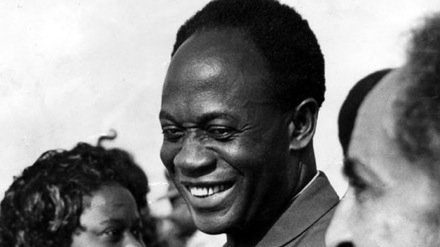Kwame Nkrumah on the role of African journalists
[From The Archives: Nkrumah And African Journalism]
One day after Malcolm X’s revolutionary “Message to the Grassroots” speech, Pan-African leader and the first President of Ghana Kwame Nkrumah delivered a thoughtful and analytical speech to commence the “Second Conference of Africa Journalists.”
November 11, 2013 marked the 50th anniversary of President Nkrumah’s “Message to African Journalists.”
This particular speech is worthy of our attention and commemoration because according to President Nkrumah, “the special significance of this gathering is that, it is the first conference of African Journalists since the Organization of African Unity was established at Addis Ababa in May this year. As such, it can do nothing less than fulfill the purpose of a continental press conference on the Unity of Africa.”
In his inauguration of the “Second Conference of Africa Journalists,” President Nkrumah, affectionately known as Osagyefo (Twi word for Redeemer), showed his love and reverence for the field of journalism by stating “it is not simply out of courtesy that I am here to open this Conference of African Journalists. Most of you will know that I come to speak to you with a particular sense of pleasure as an old journalist who can still be excited by the smell of the printer’s ink and the clatter of the printing machine.”
In regards to the African role in journalism, Osagyefo, informed the audience - “If we interpret journalism as the dissemination of news and the clarion to action, then journalism is certainly not new to Africa. From time immemorial, we have developed our own special system of transmitting news and messages across the country, from village to village, from community to community; we have devised our peculiar means of gathering our people together and putting problems before them for decision.”
Additionally, Osagyefo stated that “the talking drums and the courier have been the harbingers of news. From the days of the drum, we have accepted as an inexorable canon that the news which was transmitted should be true and the information conveyed accurate and reliable. For, the safety and the lives of many people might depend upon it.”
Then Osagyefo in his au fait regarding the history and contributions of African journalism enlightened the eager crowd by indicating the following point:
“Indigenous newspapers in West Africa have at least a hundred years of history behind them. In 1858, only fourteen years after the Bond of 1844 and before the Gold Coast had been annexed as a definitive colony of Great Britain, the West African Herald was edited by Charles Bannerman, a son of the soil. About the same time, John Tengo Jabavu was editing the IMVO in South Africa. In Nigeria, the basic ideas of modern nationalism were developed by John Payne Jackson from 1891, in his journal, The Lagos Weekly Record. James Brew in the Gold Coast of the 1870’s and 80’s, and J. E. Casely Hayford, a generation after, edited local nationalist papers; but they were restricted in their circulation to the few literate readers along the coast.”
In North Africa, in 1930, L’Action Tunisienne was launched by Habib Bourgiba, now President of Tunisia, and a group of his Neo Destour party members. In the Ivory Coast in 1935, the journal L’Eclaireur had an immense success in African circles. It led a campaign against reactionary chiefs and colonialist oppression.
It demanded measures of social reconstruction and urged the cause of the unemployed and of the African farmers, who had been hit by the colonialist — made economic crisis. Nnamdi Azikiwe’s West African Pilot and the organ of the Convention People’s Party — the Accra Evening News in more recent years, led in the field of nationalist journalism. Wallace Johnson of Sierra Leone, with his West African Standard, did some ground work in trade union journalism.
The Africanist emerged as the custodian of South African nationalism in 1953 and remained a revolutionary mouthpiece of the Africans of South Africa. Its founder and first editor was Managaliso Sobukwe, President of the Pan-Africanist Congress of South Africa, who is now detained indefinitely on Robben Island after serving three years’ imprisonment for his part in the cause of freedom. George Padmore, working outside Africa, but identifying himself completely with its struggles, carried on almost all of his adult life a tenacious fight for African nationalism and independence. His contributions to the press of Africa and to that of peoples of African descent in the West Indies and the United States; his widespread journalistic writings throughout the world, served as rallying point and inspiration to the leaders of African independence and the masses.”
For Osagyefo, the aim of this assembly is to simply empower African journalists with a Pan-African outlook and political consciousness. Moreover, for President Nkrumah it is the responsibility of African journalists worldwide to serve as the fourth estate by maintaining active surveillance on government, corporations, and political and academic prostitutes.
According to President Nkrumah, as African journalists, it is our responsibility to use the highest standards, integrity, precision, and other ethical codes of journalistic conduct such as being factual without yielding to neo-colonialism, idealism, sensationalism, and plagiarism. Hence, for Osagyefo, plagiarism or not identifying your source is the greatest disrespect and crime in journalism which ultimately hurts the journalist’s credibility not only as a reporter or writer, but as a person not true to the global African cause of sovereignty and liberation.
Thus, one who plagiarizes or does not identify his or her source is not only unprofessional and repugnant, but is a criminal and traitor to his or her own people. For Osagyefo, that person who engages in such an illicit enterprise cannot be trusted under any circumstance due to his or her treacherous disposition.
Osagyefo also informed the audience about the rigor, professionalism, and seriousness of journalism by stating the following:
“As a professional man, the African journalist shares with other journalists throughout the world, the duty of gathering information carefully and of disseminating it honestly. To tamper with the truth is treason to the human mind. By poisoning the well-springs of public opinion with falsehood, you defeat, in the long run, your own ends. Once a journal gains a reputation for even occasional unreliability or distortion, its value is destroyed.
It is no wonder, then, that for every decent or well-informed journal in a capitalist country, you have many more of the kind that concentrates on sensationalism and scandal; that cover up facts or, deny them; that manufacture news in order to mislead and corrupt. There are journals that employ special techniques of presentation in order to ensnare the minds not just of thousands, but of the millions that read them. Every mean, both subtle and raw, are used to maintain sway over the minds of men, and thus secure and hold their support in the continued exploitation and suppression of the oppressed. Often they are led to concur in their own exploitation. They are enjoined against peace, they are maneuvered against freedom and right.
Unfortunately, some of these journals have made their way into our continent and are employing their influence to wean our people to ideas and ways of life that run counter to our image and our hopes. We must be vigilant against their penetration and their incitement. We must be careful not to take their falsities as models, either for our public or our journalists. For our African journalists have; different task, a higher responsibility, a greater objective, which demand a mould of quite another order. Whether they are aware of it or not, they are misusing their talents and their opportunity in the interest of Africa’s enemies and against those of our people, our continent and our cause.
We who are fighting against colonialism and imperialism, we who are lighting against the blandishment of client states and settler governments in Africa, and are seeking to create a just society in which the welfare of each shall be the welfare of all, must stand against the methods of those whose journalism has precisely the opposite ends. We have nothing to gain by suppressing or distorting facts. Circulation of itself is not our first consideration; though obviously, we are anxious to reach and inform the widest possible audience.
But we have no wish to play upon the gullibility of that audience, for it is precisely to the interests of that audience that we are dedicated. And we can only promote those interests by self criticism and the faithful presentation of truth and fact. The journalist who works faithfully for our African Revolution refuses to sell his soul to imperialism and to Moloch, and thus starts with an advantage over his colleagues of the imperialist and neo-colonialist press. His integrity, as long as he persists in this decision, is assured.
To the true African journalists, his newspaper is a collective organizer, a collective instrument of mobilization and a collective educator — a weapon, first and foremost, to over-throw colonialism and imperialism, and to assist total African independence and unity. The true African journalist, abjuring imperialist blandishments and bribes, can certainly call his soul his own.
His work may be more difficult because of deficiencies in the technical means of gathering information and the daily harassments that confront him; his remuneration may not be great and expense accounts non-existent. But he has other more satisfying rewards. He draws contentment from an honest job honestly done. His satisfaction is in his integrity, in work performed for the betterment of his fellows and the society of which he is a worthy member. He does not need to peep through keyholes for scandals, or bribe underlings to divulge what should remain private and personal; he does not need to concoct for manufacture exciting revelations. He is not forced to doctor news and debase public standards to fit the purpose of the rich and the public would — be richer. I am reminded here that a British journalist friend of mine once told me that sometimes, the news items he sent to his paper in London were so doctored that he had difficulty in recognizing what he himself had written. The true African journalist very often works for the organ of the political party to which he himself belongs and in whose purpose he believes.
He works to serve a society moving in the direction of his own aspirations. These are high rewards for an honest man in the course of his professional career. But they are not earned without corresponding responsibilities. Every African is responsible to the African Revolution by the heritage of his birth and by his experience of colonialism and imperialism. The responsibilities of the journalist come particularly high in the hierarchy of our revolution; none higher, none more onerous, none more satisfying than those of an African journalist using his talents and his integrity in adverse and sacrificing conditions, not only in the cause of the freedom and independence of his country, but in the wider cause of the political unity and cultural and material development of the African continent, of which his country is a part. Truth, we say, must be the watchword of our African journalists and facts must be his guide.
These tenets, however, must not excuse dullness in our newspapers and our journals. They must not be used as a cover for shoddy writing and ambiguous intentions. The African journalist is not only expected to communicate the facts and aims of our African Revolution, but to do so compellingly and without fear. He must continually and fearlessly expose neo-colonialist subterfuge. He must attain a proper understanding of the African Revolution, its purpose and its travails.”
Like Malcolm X in his “Message to the Grassroots,” President Nkrumah clearly identified a common enemy and echoed the high volume call for unity, revolution, sovereignty, and power within the global African community by using journalism and “any means necessary” to expose and vanquish global white supremacy and its neo-colonialist prostitutes.
Professor Patrick Delices is a political analyst/commentator for the Black Star News and the author of “The Digital Economy,” Journal of International Affairs. For nearly a decade, Prof. Delices has taught Africana Studies at Hunter College. He also served as a research fellow for the late Pulitzer Prize recipient, Dr. Manning Marable at Columbia University.







